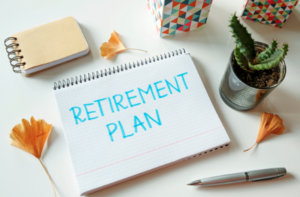Pensions are a key part of your retirement planning. Yet, when Interactive Investor*, a pensions and investment provider, conducted its latest Great British Retirement Survey in 2023, it found that three quarters (approximately 76%) of self-employed individuals do not pay into a pension while 38% do not have a pension of any kind.
What is a pension and how does it work?
A pension is a product designed to provide an individual with a method of saving for their retirement. Anybody paying into a pension will qualify for tax relief at their marginal rate of tax up to an annual allowance of £60,000.
Payments into a pension will grow over time and this pot of money can be accessed from the age of 55 to provide an income in retirement. From the 6th of April 2028, the age at which you can access a pension will be rising to 57.
There are various options available once you can access your pension from taking a lump sum to purchasing a guaranteed income for life (annuity). Another benefit of a pension is that on death it is normally free of inheritance tax (IHT) and does not form part of your taxable estate.
Any money taken out of your pension will become part of your estate on death and, therefore, be subject to IHT. With the tax relief available on your contributions and the potential for your pension pot to grow over time, starting a self-employed pension is a key part of planning for your future.
What are my pension options if I'm self-employed?
There are five main types of pension available for the self-employed, explained below. You will get tax relief on any pension contributions you make with these types of pensions.
Ordinary Personal pension
An ordinary personal pension typically involves contributing to a ready-made fund of your choice offered by a pension provider. You won't have to manage your investments if you don't want to, as the provider will do this for you.
Typically, this type of pension is covered by the Financial Services Compensation Scheme (FSCS) up to 100% if the company goes bust. You won't be covered for any investment losses, though.
Stakeholder pension
A stakeholder pension is a personal pension with low and flexible contributions, capped charges and a simple default investment strategy. It allows flexible contributions which may be useful for those who are self-employed and have a fluctuating income. It's covered for up to £85,000 under FSCS rules if the pension provider goes bust, but is not covered for any investment losses.
Self Invested Personal Pension (SIPP)
A self-invested personal pension (SIPP) is essentially a pension 'wrapper' that holds a selection of investments until you want to withdraw a retirement income. It is similar to a personal pension but with a much wider range of investments to choose from including the opportunity to create your own portfolio.
Even if you have no investment knowledge you should not be deterred from starting a SIPP as most SIPP platforms have ready-made investment portfolios to make your investment choice easier.
This type of pension is covered for up to £85,000 under FSCS rules if the pension provider goes bust, but is not covered for any investment losses. If you think this might be the right pension for you, we suggest you read our comprehensive article - The best and cheapest SIPPs to find the best SIPP provider for you.
NEST pension
The National Employment Savings Trust (NEST) was set up by the government to ensure everybody has access to a workplace pension scheme. NEST pensions are also available to a self-employed person as long as they are either self-employed or a single person director of a company and between the age of 16 & 75. A self-employed person will need to set up their own contributions to NEST, however. With a NEST pension if you move from self-employed to being employed, you can still keep your existing NEST pension with the ability for more contributions to be added
More information regarding NEST can be found in our independent NEST pension review.
Small Self-Administered Schemes (SSAS)
A Small Self Administered Scheme (SSAS) is typically set up to provide retirement benefits for a small number of directors or key staff of a business. It's run by a small number of trustees who may also be members of the scheme.
Unlike a SIPP, a SSAS is classed as an occupational scheme which means there are slightly different rules at play with them. One advantage of a SSAS is that you can use it to invest in the business of a director whereas with a SIPP, you can't.
For a more detailed explanation of the various self-employed pension schemes, check out our article 'Which is the best pension if you are self-employed?'
Am I entitled to a State pension?
Self-employed people are typically entitled to a state pension as long as they meet the criteria. This typically includes:
- A minimum of 10 qualifying years on your National Insurance record to get any state pension
- A minimum of 35 qualifying years to get the full basic State Pension.
Whilst the State pension may provide you with an income in retirement it is unlikely to be enough to live a comfortable retirement. It's currently set at £221.20 per week which amounts to around £11,500 per year. This may be enough for a very frugal retirement if you own your home outright, but it's best not to rely purely on the state pension if you can help it.
Also, as life expectancy increases, it's likely, that the retirement age at which the State pension can be accessed will be increased over time. The current state pension age is 66 years old for both men and women, but this is due to increase to 67 by 2028 and again to 68 by 2046.
How much should I save into my self-employed pension?
The exact amount you'll need to save will depend on various factors including:
- current age
- proposed retirement age
- pension income required at retirement
The earlier you start your self-employed pension, the larger your pension pot will be on retirement and the lower your monthly contributions will need to be. This is because of the effects of compound interest over time. To start working out how much to save for your pension, you could try out our free pension calculator.
Do you get tax relief on a self-employed pension?
As a self-employed person, there is no limit on how much you can pay into your pension. However, contributions up to £60,000 will attract tax relief at 20% which will be claimed by your pension provider on your behalf.
If you are a higher-rate taxpayer, then you can claim an additional 20% in tax relief through your tax return. And, if you're an additional-rate taxpayer, then you can claim a further 5% through your tax return for total tax relief amounting to 45%.
What are the rules for accessing a self-employed pension?
As your self-employed pension is a type of private pension, you can typically access it when you turn 55. However, this is due to increase to 57 from April 6, 2028 and may go up again if legislation changes. Cash taken from your self-employed pension will be tax-free up to 25% of the pension pot. Beyond that, you'll need to pay income tax.
What happens if I move from self-employed to employed?
If you change your employment status from self-employed to employed you can still contribute to your existing self-employed pension if you wish.
Also, you will typically be auto-enrolled into your workplace pension scheme unless you opt out. It's usually a good idea to join your employer's workplace pension scheme, however, as they normally need to contribute a minimum of 3% of your income to your pension by law. Some will contribute more. You will also get tax relief on top.
What happens if I move from employed to self-employed?
If you move from being employed to self-employed you have the following options:
- continue to pay into your current scheme if the option is available
- leave your workplace pension as it is and benefit from future growth or defined benefit
- start a new pension
- combine your pensions into one pot which may make it easier to manage and control - check out our article 'What is pension consolidation and how do I do it?'
If you currently have a defined benefit pension (one that pays a pension based on your length of service) then seek financial advice before making any transfer to another pension scheme.
What happens to my self-employed pension if I die?
If you die before the age of 75 then the value of your pension will be passed to your beneficiaries free of inheritance tax (IHT) and income tax. If you die after the age of 75 death benefits will be taxed at the recipient's marginal rate of income tax.
Should I seek financial advice when starting a self-employed pension?
Normally there is no need to seek financial advice when starting a self-employed pension. Most pensions can now be started online in a matter of minutes. However, if you currently have several old pensions and you are not sure what is the best action for you then seeking the advice of a financial adviser is recommended. Check out our article '10 tips on how to find a good financial adviser'
Can I sell my business to fund my retirement?
Many self-employed people may think that the business they own could be sold to fund their retirement but there are a number of things to consider before pursuing this option. Some questions to ask yourself include:
- What is the value of the business?
- Will the sale provide enough income for you in retirement?
- Will the business be easy to sell?
Many business owners who have built up a business over many years may unintentionally inflate the value of their business. Talk to an independent valuer to get a true picture of the value of your business on the open market to see if this is likely to meet your expectations.
Pension vs Property
There are many people who invest in property and see this as their 'retirement pot'. You may plan to downsize in later life to release some equity or you may be building up a portfolio of rental properties to finance your retirement.
Investing in property to fund your retirement can be a great strategy but there are several things you should consider before going down this route. Here are a few to think about:
- there will be a capital gains tax to pay when you sell a property
- income tax is payable on your rental income
- inheritance tax is payable when you die
- you may not be able to sell when you want to
- you could end up in negative equity
- you may have to pay stamp duty when you buy a property
- costs can be high, such as repairs, maintenance, legal fees, surveyors’ fees, agents’ fees, insurance
- you may have vacant periods with rental properties and receive no income
- you can spend a lot of time and effort managing a property yourself, and you have legal responsibilities as a landlord
- if you were thinking of funding your retirement by downsizing, you may change your mind when you near retirement age
Conversely, there are things to consider when investing in a pension
- your money is locked away until age 55
- there’s no guarantee of investment performance – your investments could fall in value meaning you may run out of money in retirement
- you have to pay fees and charges on your investments
- some schemes have limited investment choice and poorly performing funds
- you pay income tax on anything you withdraw above the 25% tax-free lump sum
- various scandals have tarnished consumer trust in the pensions industry
There is no right or wrong answer on the subject of Pension v Property, it really comes down to personal preference and your attitude to the different risks involved.
For a more detailed explanation read our article - Property v Pension which is the best investment
Pension vs LISA
The Lifetime ISA (LISA) was launched in April 2017 and offers those aged 18 to 40 an alternative when it comes to retirement funding. The key things to keep in mind with a LISA include that:
- you can save up to £4,000 per year tax free
- you can save as part of a stocks & shares LISA or cash LISA depending on your tolerance to risk
- you can get a 25% bonus from the government
- you can contribute up to your 50th birthday
- you can access your savings from the age of 60 (with a normal personal pension, you can access them from the age of 55 right now)
- you could access your savings earlier but a withdrawal penalty will apply
- any withdrawals you make will be completely tax free (unlike with a traditional pension where you only get a 25% tax-free lump sum before tax applies)
LISAs can be a great way to save towards your retirement as you get tax relief on your contributions and you can also withdraw the full sum tax-free. However, you can currently only access your funds when you're 60 which is five years after you could access your funds if you contributed to a pension. This is something to keep in mind, particularly if you're hoping to retire early.
That being said, a stocks & shares LISA could be a great way to supplement your retirement savings.
If a link has an * beside it this means that it is an affiliated link. If you go via the link, Money to the Masses may receive a small fee which helps keep Money to the Masses free to use. The following link can be used if you do not wish to help Money to the Masses or take advantage of any exclusive offers - Interactive Investor






